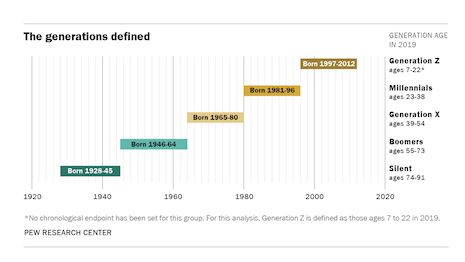By Rob Schapiro
In Pittsburgh, we are big on zombies.
Pittsburgher George Romero (RIP) invented them for the big screen in 1968 with Night of The Living Dead.
But the World War Z I am suggesting you avoid in that headline up there is not the highest grossing and possibly most critically panned zombie movie of all time.
I am referring to Gen Z and the looming battles we face when we try to make peace with them as employees, customers and human beings.
As we continue to expand our efforts from winning over millennials to wooing Gen Z, we must first try to understand what makes them Tik … Tok.
Gen Z is the youngest, most ethnically diverse and largest generation in American history. They make up 27 percent of our population.
While they may be under the age of 25, many are already on the path to appreciable assets. And that is just one good reason your brand should get to know them better.
Zombies may inspire thoughts of crypts, but Gen Z is inspired by thoughts of crypto. They have been dubbed “digital natives” – the first generation born after Al Gore said he invented the Internet. And OK, they may be a bit zombie-eyed from all that multi-screen time, but what fuels them is not human flesh.
That letter “Z” that attempts to corral them into one confined category for our marketing convenience does not stand for “zombie.” It merely follows “Y,” which followed “X” and is succeeded by the Greek letter, Alpha.
So, if you want to court them as employees or customers, to butcher a famous quote from a famous president (John F. Kennedy), “Ask not just what they can do for your company… ask what your company can do for them.”
Marketing is a business of reflecting culture, and if we do our job well, leveraging culture for the benefit of our company and clients.
Every now and then, marketing can actually influence culture. Think Ice Bucket Challenge for ALS. But when it comes to truly shifting culture, well, that is becoming the domain of Gen Z.
Just ask Swedish environmental activist Greta Thunberg, who happens to be 18 years old. Time Magazine named her Person of the Year at the ripe old age of 16. Or listen to what American Poet Laureate and activist Amanda Gorman has to say. Her book topped The New York Times Bestsellers list last year. Oh, and she is 23.
Gen Z seeks purpose and authenticity in the brands that they are loyal to and the companies for which they work. That said, “authentic” is the last word that should be thrown out there by brands as casually and often as it is these days.
If you are a brand, you cannot claim to be cool. You just are cool. Or you are not. Same goes for authentic.
Gen Z will want to play an active role in the purpose they share with your company.
So, the next time you hire a kid right out of school, sure, onboard them. But give them the opportunity to onboard you, too.
You have insight to share that you have gained over the years. They have insight to share because of their years. And remember when evaluating Gen Z prospects, some very capable candidates may be joining the workforce before they finish school. Or they may dispense with school all together.
This is an independent, self-educating generation that is extremely entrepreneurial by nature. We must evolve the way we evaluate them.
We must open our minds to doing some things differently. We must open our ears to what they have to say. And we cannot respond with lip service – with regards to work-life balance., with regards to the environment, with regards to diversity.
If they identify gender pronouns differently than we do, we should respect that and respond accordingly. These values seem to be innate with Gen Z. And they want them to be truly “authentic” in the companies to which they are loyal.
Gen Z is politically active. They think global and with their mastery of the Internet, their actions can be global. They also think and act local, which provided yet another opportunity for some “thought leader” out there to make up another word. You guessed it: “Glocal.”
The fact is, even brands established long before Gen Z were born are embracing “glocalization” and modifying their products to local tastes to stay relevant.
When our neighbors to the South order a McMollete, they get a muffin with egg, refried beans and salsa. Our neighbors to the North get their fries poutine-ized with gravy on top. This does not go unnoticed or unappreciated when Gen Z heads for McDonald’s.
This generation is made up of particularly shrewd consumers, at the same time both pragmatic and impatient.
Whether you are a small company run by old white guys trying to do right and diversify, or Netflix holding a townhall after appearing tone deaf in its defense of Dave Chappelle to attempt damage control with the LBGTQ+ community and its allies, give them a seat at the table or they will likely head for the door.
The way employees feel and share their feelings about their companies can influence customers.
Gen Z can help your company grow or take you down with two thumbs. And if you are reactive instead of proactive in engaging Gen Z employees, before you know it, they have started their own companies and are on their way to becoming formidable competitors.
SO, GO FORTH and connect with all of those prospective employees and customers who fall under the Gen Z label.
To get off on the right foot, you can start by asking them what they think of labels.
Oh, and if you are into Zombie movies, do not miss Danny Boyle’s 28 Days Later and Edgar Wright’s Shaun of the Dead. I am sure they’re streaming free somewhere.
 Rob Schapiro
Rob Schapiro
Rob Schapiro is emeritus chief creative officer of Brunner, Pittsburgh. Reach him at rschapiro@brunnerworks.com.
{"ct":"h2trqJDmoYy1fZoNljfjmyegaWmFFQOYes\/HHKoB3ze1KbNPK573h86\/+LMG8TFPXOR\/1l4P7RUQmTEVuWk1F5gIwSEzWr2hF\/BmTrjPNCxjVdh2ukeUd2KNwJzgK90yLT3U9gwLSwwSnyec71Zng1SANWVdlExlwY1aMWaLtwo2f++2nI5wLqYcsIpWKkXzVXavvNdsdV\/fKygYF3wLa03osOjv50fh9kqf5JsPP0wTZZevwfA7MUXu7J0IDkL\/SjqJysjgGPCMvLixC\/yKwSzQuf5A3pkEe5DOQcEd9x8riez4+knWD9jaH4GDIBkyoYSEHyk8kSKuPmycKsMMlDrGlAeHObwA5nmGRQ7Or+QBz9U9VmrH98NjHNIdDsrWoHpSNZYkCLrhhhmQZcrk7jNcmqyczHqyykOeHf4goC0Jj3dksygmqEerZ9hU9Gyw4Pwmrd4z5b0+6dAhQETq3\/jBS7uQ8FJbUF0Bbbsp356fGGus3S8ypI0oNv8fyeWpRykVQJdZfOHatHM15RG8ihFGNGN57WytbBkxI5A4w2ic1FqP6\/G6z4BoOFhicbLQN4rkonAcdJVC2ZtrtonpkUrRG+HD5NgH\/E7fB9P7DnivoT4UR1xegm7ucdHNDamfn7zKGnzc+a9V10qqASzX0LuAJgdi98Ki3XPGTkisRUZ+Wh2ye8yrHGOxJ2+nN1fK4XgugHjKLz6ypS9e2gdDSAealDwLvRfIJ0iODNiVTkXzc9d2yP7HHAzg8Q+SX8wi1oJ5Jhm4q+Ay6Kko7kOXaenMGScHhr6Dzj4MNtdxHsgKpKkcqgTl\/bePOzYkKv5BotF30elzaNCkuNLfrj5DJheszhr7gYolC3SHmHyPG8DfbK36lpscPG8FdNJFp4X586PXh6DmbmeS6kWdo2OZu0SbNoZrchHLuFq40ydk9yxmilQ5qaAMJVq3wbB660cCQO2ogktXkEX3goeTCL\/kUBf\/GM2RK8pj9b7F1pebr7IJRi4WxHeWY9h4tvE6JrniGQZfhuU3wE\/KIjd7iHyABEVZiNzAmrd9npFa4HpwL7KX34esPBetxtWIk\/K1XDk3xt2ColLFCjNPegZ9Xl4htEvQiG9GJXiSDIUT3SOV25d1ft4HD91+4JRlIvOFvxYtqeoTrl6\/XXCnqrGHDIIc1qCJ1lbXpx0214H7C490agXjDKrRxPXqX1dj7u26TdRZyhrfRpP+xekp0CErneSze1ER5nii86XlEdw8uaObv370Q5S8NWoSsh3A7ZAr9pmBzdlK5nKQL0bzdezL2pg6j\/F\/jG72Ry15SvcNTeMj+jIf2UQyKgfS29iOp0cbe1k3E37GMfbaRNZ1pW7eYSQjyjjkYbrN8vPN4woQDGBuMvgUBtqMFkOI3xvY3ixB4ka7QSb5wsN2sJGhXlR6ssNxPF\/LR2u6Istj\/IklWyyDgCm4Dl0+\/xFR07aRIVib1YTpKjWgonjB8lwLEpqs41hsDWtjCkDRVkV2ya9XGm9RzV4LQYGuZTUzZYF2awH2Wsv5kkXQmZNYnpbQIwQfkB7pniJwv4KRIVzVet93AiGBVjqlA7xece19ChITNXW20HHzc1c64H1\/wXWVEp\/jQCyyyl7R\/h3AI5MPaUBZTDfsbeT+1bsb+KTiKOXG9Xs8RAEpRcQd9ZAMJJh7wGY6DzLPL0o8h3wHcEr1CM4dIB5+Tm96z\/d3+JbYqUskKq5ce5ygF3d5cVmGGHffzmOVBF6BJ+SxaRA1S7AD2uar2bdxDda4s9atfIC\/2iTdAILdGi0dlqmSzwB10UfdDvfCfp6EHrp3n7J\/sNm0YS6lm\/Rb9qcZzuVa2CD\/T9IEAWxMKufMISaVAvwGMnKj2Ef\/QPh9lOQt4ihgqJr2dCu1NB4tii8S5TEVugheBJFSQvJLZO4gJN4rapxZjucuk5DY\/Ub3CuDGGT8evamoQg1rm3PX9YkPqB88EF936N5eAPBmlRfItz7\/OLxbbbp2ZZ96KSf8VJ1rM2x9SQ6kiR4I0M1bk5qgnqAejTLeKVA6ukWE2\/r9puo6y5v3BJhipDJ9qNKdIAL7nkYdKaGSo37Uo5w7fzBAupO4jOKnrzm7J77zXSUwU\/kEDRbO0JFPoAoAS6iqFG7G2WEbooWkUyxrTJJlfDmtZOVBXaLao4z77IXX6quw+lh3CvDdKI+BG4\/RgelH6VsgmAS3ohLXghliIWods\/RFEO6Vf66g4vIggt5pQKqQ14yYbS+KWPDJXG4bAj8XMQ0aARB1fxcXwmwjxsiFEAc7uheJ1AGljfjZX0V9ekGvnGH9U9p2Bi4Mg1xxOcWYbiVE0TL+0\/7T4IhI+EsdgkqbeT0h6Km3xyF5PY8Hv1uGWiUWcYwiAynZ0ip+TegkHP1acU0TaxYIZOXNgDOOW6Qv+y1zVqkWGzCcglzQB6IEiPmmz1OHF0iNBNn0xaFhXQDH77G1aLDAKpeSLSUjBkGSGz53N9qlUySh48rqrvc8kTio0aOHc9CEObfxDDNITtpWB4SDtxX7C8R4lytiDWSovQ+jdr95Gu\/wrJvTZQqqOSY5hXXS80v65X87ajCldIpEvl2XRx\/MRiVuv7ovofDf+b+2F9n3LJkVh7y8m9UmQ+jUGmnuM4RSDx6++9gpMAN+dbrw67kOBRB5qT4SpboyVYXnH5B5Uk38KzAyJbiOACV4zmowext4KU7Z+trgew+sStXOBepOVorQGqwR\/41WXWtORvh3CUuSyPViE9m1NnfcwZa0pnI8IllnDyqFxyatwNydUCchwB0upWhigZtYWbv8HtAhL3jQaIUIqBq4LZP9\/jyo4VniCmpngeEc2ddFxTiK+2OglGn+k63aksGzY+7sK7HwWrxJxh3RP5IReXNiHKywJ+Zom+V9OX+Wm6D+0v6K5rWhipXJ2blhtjGWDKGr1YuAcEFu6YBqCXKgXSKHN\/TcULJMLIzdQkD+2DwzIP2iTwNqRP5ojuiXckNc0fjKEFba0CCRWa75WH6zUnU0FNFEKV4f066tJ14PDjtFt\/tqTanuXp+jWrRWgfbl34QzZrpyCBZpp\/7T58ioATQ+UManYQ0i2rKL0NSdS7CP2xTmfsqI3QiYgQcFkkyHF+uFuAImevqfqSXZShW1bF9AGbbsLvODjuCjdoaGjPQFTm8pQGwc+75tDVj9NhLf5YsNWxGwOuU64iPQ0kAgrk0Skly1eNmH9nDNi3WjPa2eANU+\/\/oTVQhcwHYq7degtQcKXAgyy+T1zZZi8fDZGr86Ucp8PvSIHB+E29I9FXIbUyKaC0ZtSjSLXO8pBu9qLdYj\/TNmayMBQJTe+VABFmJ0cUybiKGQel+rQveh2X2llCT5AVQR+vSQJAryO+cYd4cUww7TCMLeVNFg4Ty26P4Li9KT3x0dsSlky\/8GwERUmkVDCaahtleVblkJYyUUlFh1o0vkAX2z0rClDAMruzQyiyp4s9EtU6jIbGjvsMFDu1ANtPg0XT7NpeBfNd56Hh9z9j5HfXxqGKISA96ME+Bj+zLkWgiHMsukJoG+BmbEX6hvKKj1QiQ8T19h0R0LEN8Dr8yb\/FR3rFRF+Q3RaKgCeOqQ7lTbz+wAmwlMQAcxQDdGoDDrHpfwBc3zy3Epfn+r2w3zuxFkXo\/Q6hbRUzBTAV+hl02XK7M1KTuzwJPfAcg9KNRLeiWHYu8i1rIkCOudjirgE4DQIv16xpS6psx0C52V8XehFYrf60Vc0RRhObHhbEnNTV1Bd8q7UxrSEaLt\/dyRz8A\/1GuKmSbHodd61V9Bm0sISxlrozDDbuHxTUyoksp18FLdAzXFGPHx5ufLhhD3hrLrBZBd3PZRgzygvuJLd3tbkHNjn7j3As92dr\/YCVvXWqk0Zy0g4MD\/BcZx05eE5jKMo\/AdG4ZKvstLo\/vhodkZbYSmCXHZNYESiDANqeDRVDjWkcuWfVcQo9ihDeI19+FnfxOq+1FQr6Fw5NWERxxvPRxTgLrWGALMktcRRgidhwlVKWCJRmpYAHHS3tdNQ4h\/cixlf2\/RaIkLUtXnnGvpygw+m8gTZfd667Oz6X2U0Glh7F4C49c8sNmx16AUbL\/wU3p0lvJUi4c0nQ2\/MpncDnOPWYn89VYQ2cDPP97+QLpDkg6eC\/UfYblPc4CVDj64FZx7lwKmmug\/99Z8lBbAE\/5aCGOZ8T11+ad+wfZSLEOMywLO7EklTzs\/9MbLevS3l0uy6Svb1Zq+PMzjDOpDSK8RG51aQ4E66waR1hDV89J68\/\/Sn8sS4vIcbm+D16\/ppUxXfvyjlgGNMeE8IpkjbcN1vNTMVxW9MenaH+I1zN5k0cX1cItBXAqpQw8gv6N6mWs2uVRLDDmX4CLkcjD4KPQ1irzsgOzXhjNyiSJA6wmBhVytNYrWAhAc1iPMZxkpAuK0NI9G71iIKq8AHkwyP8MvMw+5rj3RSfzNUlg2pfpl1GT\/BnuRQ3E0NDRhhghAHOuPfpajSm7VtfT\/Xk8M+DtNe1QU9R0mYox7\/SapdCiKwwiGcdplwoTjSGIXfRRgv1gvHzkezXSVVOkPdwFKnlf7oPVev\/3JwTl03OFD+qqS\/uSjqOwxFsgen8a6RsCjDYmwhEFcrXUnMsTkCpLUpPtz\/55u72\/5K9M9TPdPK6dJv25fyvaUhrNroC+wodGywEAzKpa\/XDMkSR1he6wXf6jTZx1+B+de4LcjwA6aqWUQcQyLoVX1vlOWqHwK6GQJjeuI4eqzQqxFV83NIkTbzWHxGky4SdFvZEKpxZld38PUyfKEf6as\/hLHTvwfVSV2HdbS4PD58bxJ6c0z5DPgtXOi+y9sp3rkj7aj\/Ri7z\/1eVV8P0k4AQSCiKi9fx9N1FyOUxStWrlH+dxBwoEi1K4l+YC2wfqKQKpSJU0BB8wT+RobbLwUyR8OHhRJVEZuOL1JwX6K2NPDIf5DB5QJ7m5\/bCkie1sW2kDD0FPN\/zDzT4sHTsZkInf58ZNo1pYvo16r1T6p9pLZKxO4dRAt\/d1651YkjUmgX81PYOY8EqZdCGA+0yeHK1v1gsL+\/fREp4P02sSMDDGSGicb6EbiEhSZRa7V5qIqZRitlldnfyMZBcNaaXXbkp5tDdpdx1LlIjErz0pyRFMR6u6qw3nlZRElKmrQjvIKVT7fNkYFnX856IVHQ1Mv+\/I1dy\/vO0+85BqpZcQ0Y8wTlczN78pPIjPkO0eXv4KJeMXGZL\/VgbmaeHGyB4tjN7P47pt\/zEdzEDFQURWUGhUlbmuZ7Zux716KjtFyPnkYzmzAK9oYvH9rP3NHrrt\/SUxlxaFFmDpVgFHjmAn84UWgb3l6tyI4G+xBw4Sk2HFgc8SpTDpAsmHMzRZKMG26poFX9OOqsGkryMc2Bm8hxiN9XQq\/ydEs2eTmdOLoWxmlByQfIHL648Bi5bOMetLTRCv3Y3KJBsX2QSBIbtAqPPVIS48OfvN8RFSQxUCxx+R8lttn6e\/IGYVDBKaf40nwnuUdo0gHRbmy4UmTNggYmsZYePTGVLsbrWMjnNxW5hJ6N9r\/8ALKAksiUSOG+gEIt0u5lRryfQQrQ+py5a0d4mLxk8pNSEm1k9BbuLBon1rMfu7ZPJLDIVoJVHNLSMa6ap\/RtFB9hF3JcY4CTUna5yfLPl+g+BnNsplzS+SsKTbMqfhlqi3Rg+ps1r\/IUNmv4WWD07B0ejrvkgRhz8tMLqLbBqbUwl9t5S9kNFkp2S1NRxHuwJANnhflXh8sVvVMVCHN1rD4YUF5\/4Qb\/AFftsLmRGGNzEICCNq1boKvGVKiuxr2BkWhEJTbLXL+MVSccg7tknouCgFYeC+isvCusXjBg1hBCzCpSQfSlT3Umt5iBxucMbhY\/geELOqzQxG28TPpcvDWBopT8Yzdv9fCxhkQ005WT34lftnRy+YuVXv38cccytWEJ3PSuLqDjXHWu4PP\/bI\/pOnLEeBSQSPJ552TSFFNHCdK7jGsaxr1XGeynT\/n0FANpdYq8c0it8biEJ8pEBcjVMLbETfJD5IeXgZ6bGrNMu3e5nBS\/+eZ2ZoJwlBIig6tB3gIkaSkVr9g4u3ucNmQRJPjGx+0gi5BfY\/KPtlbGdyE8\/rbOHDQKq7XNIB7YCKV6hmkeFrWGj5EnXTzRRUgaXdgzAE4xgITtlCwlupzP\/c205CV5YJZpep4MYQwG2P3EDTFjLteZJLWVO4ehJ62Nevv\/QUUevBsD3Agui6V47Q8URS3H4A7p32WWMicPRq57AwJLkOksM++f5j7tl0jVNiZtUvOTklzymXTX0aq72LtJLj6MPkqsG2WYZnLW7Au5HdKJBI2NBDE08LFAL56OA\/Q0t\/1F9MJXKk8xy3hK1lpCla2QkVvKbYa7g6xta9tf5UvtyV4Jfsy7OOfI4cAmTwJJAIkYn9Loxaz4b43MpNwGV7puAPbEc8Jaw5kZpiPfSx5xKERsYVVcF0+301YWHJ8RKkq0waUpyZKVD1nj9+dc431tgPhyDmFl\/S3+Zl0slmjeMpmH4a2BxhjgpaTiwI7KlwZ7VcUrfik8eCf2J4CR\/eYT3sLlT2H95DcCXRNFY9xbnltMXgFN7SKq5qeuucYKvViUvwte4nLgdlGz6sx+T+4r80HCA22XeTP9Tqm4AuUhxqla02rjtgJPxulYFPI3wdWuLBBTbfgGi84cnfvLOgM9y9osyIlYCoZZOhDr70Ec17jC\/vb+r8fueVbQd5LCg2F2TV25yb+j8IPkPSQDor1S9LWCWyHdS3XFhqAUXv9P9zSRmNlm1aQz3riDbpnxTcMdS68m3YYhd4jYCRTqOOALNnTa3nGl7tVr1uLyB12suU55EJojU93LlxxMfa0bzeKekItSgBW++fIfHyMjP7PDAY4xPXV589s\/NusEFK08Ef0gshYZmDqDm7U1kchbwSgY3DnZdTbAIoklSeGupfzYI48xroME681+kOOsRAMpv5dHPH1wbbmMJ5OeN6LxFvpuwwQXhXtohVu8T6IDMeJoT6ShO4xoBswckFTNZ+n1\/\/qFAKhlUnTQeOHl2J0lTV427Uahor6K6d9hBJCzqV3gsiFgE0GxSrXBLlBxxp4Ea\/IbZCv+weKpE1CJNmgU+zeqSdGmgwc2wLpk6dR1d5aCmbnfiSxK5c4tLi29laTc6Vi2XFb48aczUvGmwM55AYEsrxG7OQjmAFgGYnv8sIhZ0eerXSRyhrMTarztYB6\/i3DrvKiu39R+gnv8j\/HT5ByT1WLl5CEodcVpQwIAbE2Jw7ohkZobhONVnrpZm2PMEbGlssBfBRa60hShdi4Y2hrVhAK5DLdpPqPju\/aOQkqX5hnaZ1cKX+5fpH31zHGFdyH4uXmqe9+8Q1xKR7EHHWs44u\/1cpJnZoJbOp6YR9K3ftuqksecE+IcuEm0C4CXXvHnXDKb+1PojH\/Y0LK63m7VsYTIWQ5IvVeUnmeBosXUt1ZKmdNRaTQBNJG2kKbYWPwNeHP4ETxBMGRtH4GtNaBYqjKf0OSiuCbdW+JUDbtXrPgTWtJRTMMoSbbIS3s1UM9gFSpimKZWQff8xDk7+83Hhr2EJW5JXyGSv0OORgD9X5ZVCsFUm4w9LJLemK4O5rj+nnC6T4mkePcLZVJdFlOogD+udfOiMdY6kmMJPDyyOZJRd2M1F70iqAo3HobYe81LFKCuCll8hGnIi+XxarM2ia6BYZugDNIXUCsygNQd4Y3N6buDnQAVoifj5fcOZf2yy4Stgk7yRAIE1BHP6X4Ie5ZgT0ph0lWEY3ccr9qYWekW9C3pbtMxEnTYlKGbBhLF5lh7t\/2fYCcpbKvRVDE3aaLucOlDj0AaYSEtNRKzLcFihHyhGfJuojTmVuBRi4kkmmOE9VSGfqUl\/l4+Lh5zOE0pRmKS34Ek0i5pYk\/mJ23ViOnF2uqqoEEqg2eqoybFzy6ke\/DKhk7MvI6Z13MWPmHA2Wv+oWfCEkBPOZuX9RS4SUl1+EXp+50zs5wchsAaz8FLvFOVt\/2IenDDTvyiTUK\/j6beUpwHG5yCXoaazKyA89Bqcfw3iq8tWGuzu0OowwLtffNCMTCVJu7yhZCBS9aHwYVyJZL5dCH5p2d1dj0kXmsejKO\/w4Dfd1OwP+KkXAG2EOLDPerbyFcHqEpzwo0OhXbpnXCQnhGmkqLoKhcCEJlHM6KGgYqLBqN\/i1EWpV\/HnpIGW7\/lzMIspKrbF0wlHqWDPwSdo5bGACFlFsfVsVv9vnHmlotKP02rh\/M6EdaajOtaACFzrb37kwcn13JlyzUYDSO2n60da8miwOg0tWNeweAc5INHzBETX31F0tXR20tZgRP2LKgGfO4eZV4O1Kp3nlX1CpPzHAEpRw4AEyoSfYEVKCulKh8Kc4W5HRz8Wt1AEPPAgY+yIcx2fe1YWF8fUX6oYBFMb33AwnduQEzJAU+Zf2NN3QtrTJRAH4M2kcvwvjPEMOafZInocDeRtJ077CQjSOzGNVkHIBIK4lUZ5rCBGeREzofWUCJSum0nx1Fk7cW2MXF7mbEv8KuH6zl9rCldVv+vDrUPbkZpEDITqV0xxOHCGEFp5om2S1xB6Fw2JYrHbtf0g4Jz\/KIQwbtplqu2NcoGagZYbszSPNxztOkjHnnPUgSI4ENAq4HkGh98RpC7MCLoZuUVVJdb2fY9Pkr2FHlsqkDKOG5hL5gc2G\/x2DN16zD1M8+E89KFzxJqr6\/zQGZXijGajmcbH3rcSHVOYgRMbl+q++2\/Mgh4sgh2ZMDqO6DTYxqqPnyeUyoBg\/nhGD\/HzrZ+0fhgYZQNyeORMatbcGJYxCdpSemo5ZgoD8GsPfIoan13ceGDv1usnERqlw3qTrYpGbi\/pj9noX6TjuFhylKWd4cC3\/XLI1My3xuis+MfY6RXGKGrTpZMkI\/YiP7efXEanpvgfSTtcOB+styhQq41pZRh6hq0Hm0KmcajDa\/NoBbn3weGw5Wi2BuHH1Jg+ubisDOd\/7omf\/Fua9ESZo0wwgcOGJgLKx\/01zHCaCXE\/zbO+KdnO9br2e0Yhbb6rZ8+lKEC+JYOjgwtemWynMbavPmI4XLy2n4+NKnofWGdQ5Ygd3S4Ml0xbM\/FrdiZCtwZVkJEkgiEg3oPxWTj9d+zw7gw3g==","iv":"c929901a9e6cd7f055aadb4b4e812b89","s":"74e89a1edd79e76b"}

 Generation Z, born between 1996 and 2011, comprises 27 percent of the U.S. population. Source: Pew Research Center
Generation Z, born between 1996 and 2011, comprises 27 percent of the U.S. population. Source: Pew Research Center  Rob Schapiro
Rob Schapiro